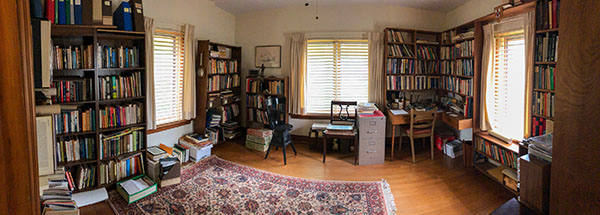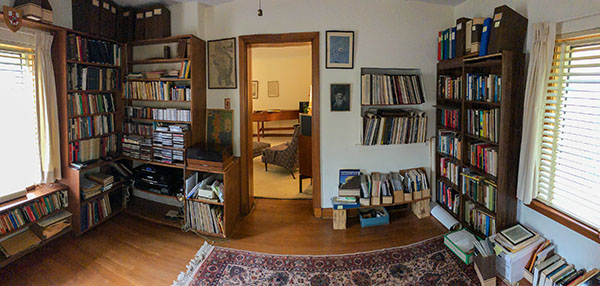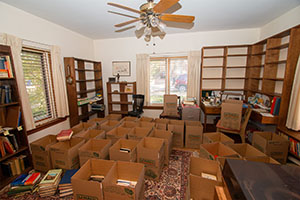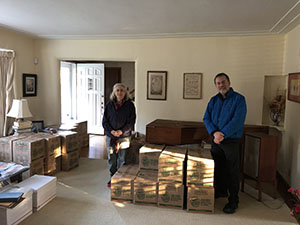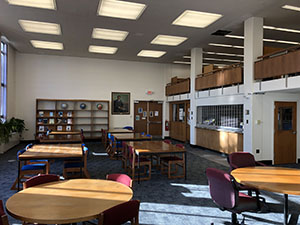Michael's Library
Michael was closely associated with the Wash U Pfeiffer Physics Library for many decades. (Wash U had perhaps ten departmental libraries across campus, in addition to the main central library.) His service there as Chairman of the Library Services Committee is described on the page on this site detailing his numerous activities within the Physics Departmenti (5th bullet item; click on the triangle).
In an analogous situation to the University Archivist having talked to Michael about donating his papers to the University and its archives (as described here), the Physics Librarian, Alison Verbeck, had spoken to him about donating his books.
Thus, in the fall of 2022, as Jessica prepared to move from the University City house they had shared for more than 50 years, Rachel and David sorted through his books to determine what to donate (and which to keep for themselves and for grandsons).
In all, forty-five (45) one-foot cube U-Haul boxes were filled with his books. While these were mostly from his study, they also came from all over the house. And they covered basic physics, history of science (both ideas and people, especially Galileo, Oppenheimer, Einstein), science and society, philosophy of science, pseudeoscience, archaeoastronomy (including Cahokia, Stonehenge, etc), academic freedom, and more.
In late October 2022, these were delivered to the Pfeiffer Library, where they were eventually cataloged and given special book plates (in an area with other faculty-donated books).
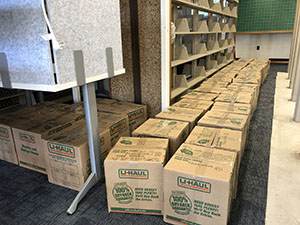
45 boxes of books delivered to
Pfeiffer Physics Library, October 28, 2022
(Three of these are hidden inside the carrel.)
"Library Thing" catalog
David wanted to have a record of the collection, and discovered the Library Thing community, which has quite a well-done smartphone app [Apple App Store| Google Play Store] to aid in entering books.
For modern books, it's easy: aim the smartphone camera at a book's bar code, and it is instantly recognized and added to the catalog. This works well for books since roughly 1986 (?). For books after 1972 or so, one can use a numeric keypad to enter the ISBN, which also works well. For older books, however, it is more of a challenge. It seemed to be hit or miss to enter Library of Congress catalog numbers, so one oftentimes had to enter author and/or title and then hunt to find a match to the book in one's lap.
Since so many of Michael's books were acquired in the 50s, 60s, and 70s, it made the process much more slow-going. Moreover, it was not uncommon to enter a book and be presented with a, say, 5th edition, or even an e-book version of a given title, when the book in one's hands was a first edition from 1947 or whatever. David did not aspire to correcting every element of a book's entry.
The book covers also presented a challenge. Many of the photographs previously uploaded by other Library Thing users were of poor quality, not to mention frequent cases where the books simply had different covers. With the help of a small mini-tripod-mounted 3x5" LED panel, David took photos of more than 500 books, unwittingly earning a "Covers Uploading" gold badge from the Library Thing community.
Overall, more than 1200 books from Michael and Jessica's library were cataloged, and more than 1100 books were donated to the Physics Library. (Several dozen books never showed up in Library Thing's sources, so David simply photographed the covers to have some sort of record and moved on.)
LibraryThing allows members to share their collections, so here is Michael's collection (1086 books):
Michael's "Library Thing" catalog (opens in new tab)
Overall, the family is grateful that his collection could be kept intact and not relegated to discount bins at used book stores or thrown away.
